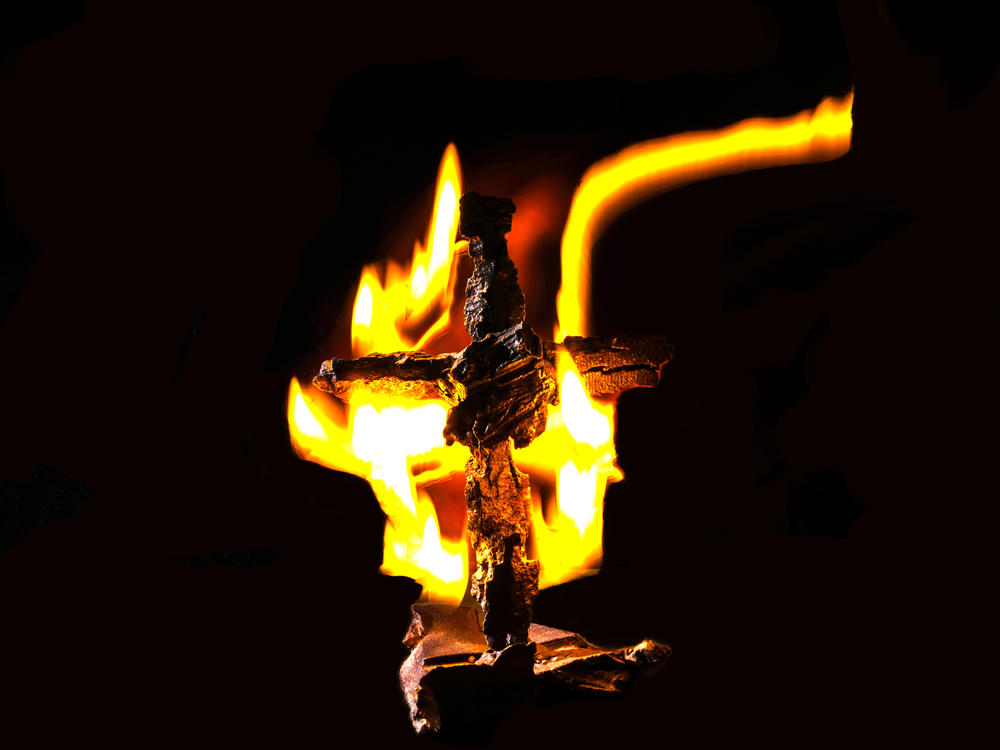Section Branding
Header Content
A Mississippi man burned a cross in a hate crime, the U.S. Justice Department alleges
Primary Content
A Mississippi man has been charged with a federal hate crime and arson violations after he burned a cross in his front yard in order to threaten and intimidate a Black family, according to the U.S. Justice Department.
Axel C. Cox, 23, is charged with one count of criminal interference with the right to fair housing and one count of using fire to commit a federal felony in connection with the alleged cross burning.
According to court documents obtained by NPR, Cox burned a cross in his front yard on Dec. 3, 2020, and used "threatening and racially derogatory remarks" toward his Black neighbors.
Cox chose to burn the cross in front of his Black neighbors because of their race, according to the Justice Department.
Cox's action of burning the cross, federal prosecutors say, falls under the Civil Rights Act of 1968 (sections of which are called the Fair Housing Act), which prohibits discrimination against a person's housing rights based on the individual's race, religion, national origin, sex or family status.
"The way hate crimes occur and how they are occurring in our community doesn't look the exact same as it did many decades ago. But the impact is the same," Rachel Carroll Rivas, interim deputy director of research and analysis for the Southern Poverty Law Center's Intelligence Project, told NPR.
"Still today, this is unfortunately neither a new problem nor a problem that has gone away completely," she added.
If convicted, Cox will face up to 10 years in prison for violating his neighbors' housing rights and a mandatory minimum of 10 years behind bars for using fire to commit a federal felony. He also faces a $250,000 fine "with respect to each charge," the Justice Department said in a statement.
Cross burning's origins are rooted in racism
Cross burning, also referred to as cross lighting, is considered a hate symbol often associated with the Ku Klux Klan since the early 1900s, according to the Anti-Defamation League.
In a 2014 interview, David Cunningham, author of Klansville, U.S.A., told Fresh Air's Terry Gross that the Klan's act of burning crosses was a symbol of "intimidation and terror."
"The crosses they burned there were often 60 or 70 feet high, so these are enormous crosses they were burning. In itself [they] were just a symbol of how ambitious the Klan's organization was," said Cunningham.
"So the act of this enormous cross burning became an act of compelling theater and also the sort of signal of what the Klan was able to accomplish organizationally," he added.
Vangela M. Wade, president of the Mississippi Center for Justice, told The Associated Press that modern-day cross burnings bring back the blatant racism associated with the Jim Crow South.
"This is another stark reminder of how bigotry, racism and hate-fueled violence are alive and well in our country. Mississippi is no exception," Wade told the AP.
Steps are being made against the rise in hate crimes
With the rise in hate crimes and hate incidents, federal and state officials are taking new steps when it comes to reporting bias incidents.
In May, the Justice Department announced a series of new guidelines and $10 million in new federal grants to help states develop hotlines for reporting incidents.
Additionally, the Justice Department issued new guidance with the Department of Health and Human Services aimed at raising awareness of hate crimes during the COVID-19 pandemic, as the U.S. experienced a surge of hate crimes and hate incidents against Asian American, Native Hawaiian and Pacific Islander communities.
"Throughout our history, and to this day, hate crimes have a singular impact because of the terror and fear they inflict on entire communities," said Attorney General Merrick Garland in a news release.
In August, Maryland officials launched an alert system to flag racist incidents and acts of hate. The Emmett Till Alerts system, named in honor of the 14-year-old who was abducted, tortured and killed in 1955 after being accused of whistling at a white woman, will act as a warning system if credible threats are made.
The warning system will notify Black leaders across Maryland of any credible racist incidents or hate crimes that take place anywhere in the state. Once a hate crime or racist incident is reported, a team of people will determine whether an alert should be sent.
The Emmett Till Alerts will be sent to 167 Black elected statewide officials in Maryland along with national civil rights organizations, clergy members and other leaders.
Copyright 2022 NPR. To see more, visit https://www.npr.org.

